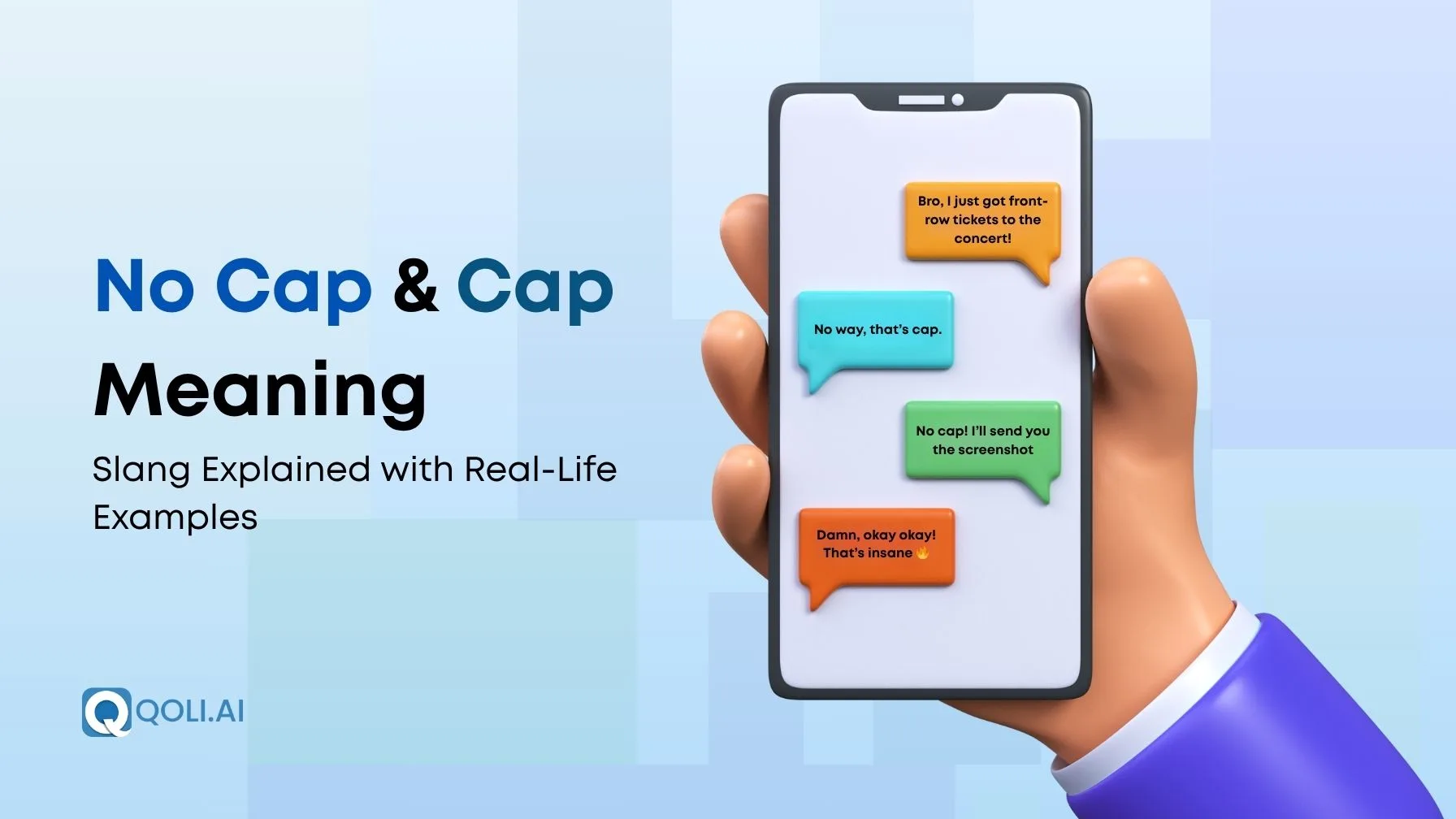No Cap & Cap Meaning: Slang Explained with Real-Life Examples
Unpack "no cap" and "cap" slang terms! Discover their meaning, origin, and how this expression is used to emphasize truth or a lie in real-life examples.
Author: Sujith Grandhi
Unpack "no cap" and "cap" slang terms! Discover their meaning, origin, and how this expression is used to emphasize truth or a lie in real-life examples.
Author: Sujith Grandhi

Ever catch your kid scrolling through their phone and suddenly they shout "That's cap!" on the screen? Or maybe they come home from school talking about how their friend was "totally capping about getting a date to homecoming"?
These two little words have basically taken over teenage conversations. Once you know what they actually mean, you'll start hearing them everywhere - and you might even catch yourself using them too.
"No cap" basically means "I'm not lying" or "I'm being totally honest."
When someone says "no cap," they’re trying to emphasize that they’re telling the truth, like really, for real. Think of it like saying, “I swear” or “Honestly.”
You’ll often see it at the end of a sentence when someone wants to make sure you know they’re not joking or exaggerating.
It’s a simple way to double down on truthfulness, especially when something feels unbelievable or surprising.
That’s the exact opposite of the tone in atm slang, where meanings shift based on context and emotion.
The no cap meaning in slang is all about emphasizing honesty or truthfulness. When someone says "no cap," they’re making it clear that they are being serious and not exaggerating or lying. It’s used to show that something is real or believable.
Other trending slang like sigma also gained attention for shaping how Gen Z expresses identity and confidence.
Now let’s flip it.
Cap means a lie or something exaggerated. If someone’s capping, they’re saying something that’s not true; maybe they’re bragging, showing off, or just trying to sound cool.
Basically: fake, not true, or hard to believe.
You’ll also hear “stop capping” or “he’s capping,” all pointing to someone not being real or honest.
The cap meaning slang is all about calling out when someone's being cap (being dishonest) or when a statement seems too hard to believe.
Response: "Bro, that's cap!" (Translation: "No way that's true!")
Sibling: "Stop capping!" (Translation: "Stop lying!")
Ready for a history lesson that's actually interesting?
The no cap origin story isn't some random internet creation; it's got serious roots! This term didn't just appear overnight on TikTok. It actually comes from African American communities and has been around way longer than you might think.
The fascinating backstory:
Here's where it gets really cool: Rappers Young Thug and Future basically launched this term into the stratosphere when they released the track "No Cap" and helped it get popularized in 2017. Suddenly, what had been part of African American vernacular English for decades became the hottest slang on social media.
Slang like delulufollowed a similar viral path, spreading fast from niche groups into mainstream platforms.
From Atlanta to everywhere: The expression spread like wildfire through hip-hop culture, then jumped to social media, and now your kids are using it at the dinner table!
These phrases show up mostly in text messages, social posts, school hallways, and casual chats. You won’t hear them in a formal meeting, but if you spend five minutes on TikTok or around teens, you’ll definitely catch one.
Here’s how you might hear them used:
Using “No Cap” to Emphasize Truth
When someone says it, they want to make it super clear they’re telling the truth.
Some people use “cap” almost like sarcasm, not to be mean, but to call out a funny or wild exaggeration.
Let’s bring it into your world, these are the kinds of messages or convos you might actually see:
Texting with your kid:
Family group chat:
Facebook post:
Instagram comment:
You might not use it yet, but now you won’t feel lost when someone else does.
These are definitely informal terms.
You’re not going to write “no cap” in a school essay or say it in a business meeting. But in text messages, DMs, and social media – it fits perfectly.
So when your kid texts you something wild and says “no cap,” they’re just giving you their version of “seriously.”
And if you say something that feels hard to believe, don’t be surprised if they reply, “That’s cap in slang.”
Want to expand your slang skills a bit? These terms fall into the same vibe.
Slang Alternatives for “Cap”
Slang Alternatives for “No Cap”
This is where things get fun – because the way you reply matters. Whether you’re joking, teasing, or confirming something, these responses help you connect.
Responding to “No Cap”
Responding to “Cap”
You can't control what happens online, but with QOli, you can monitor messages and ensure safety.
Slang evolves fast. But once you get the hang of it, it’s not as confusing as it seems. The next time you hear your teen say "That’s cap" or post "no cap" online, you’ll know exactly what’s going on.
Cap, in slang, means someone is exaggerating, lying, or showing off. And no cap means they’re being real – telling the truth. These phrases have their roots in African American Vernacular English, and have exploded thanks to social media, hip-hop, and younger generations who use slang as part of their everyday language.
It’s not just about staying trendy – it’s about staying connected.
So now when someone says, “This guide helped me understand cap vs no cap, no cap,” you can smile and say, “Facts.”